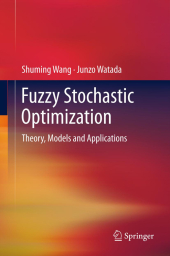 Neuerscheinungen 2014Stand: 2020-02-01 |
Schnellsuche
ISBN/Stichwort/Autor
|
Herderstraße 10
10625 Berlin
Tel.: 030 315 714 16
Fax 030 315 714 14
info@buchspektrum.de |

Shuming Wang, Junzo Watada
(Beteiligte)
Fuzzy Stochastic Optimization
Theory, Models and Applications
2012. 2014. xvi, 248 S. 43 Tabellen. 235 mm
Verlag/Jahr: SPRINGER, BERLIN; SPRINGER NEW YORK; SPRINGER 2014
ISBN: 1-489-99273-1 (1489992731)
Neue ISBN: 978-1-489-99273-4 (9781489992734)
Preis und Lieferzeit: Bitte klicken
This book looks at the framework of the fuzzy random optimization including theoretical results, optimization models, intelligent algorithms, and case studies. It presents how to design the solution algorithms to these fuzzy random optimization problems.
In 2014, winner of "Outstanding Book Award" by The Japan Society for Fuzzy Theory and Intelligent Informatics.
Covering in detail both theoretical and practical perspectives, this book is a self-contained and systematic depiction of current fuzzy stochastic optimization that deploys the fuzzy random variable as a core mathematical tool to model the integrated fuzzy random uncertainty. It proceeds in an orderly fashion from the requisite theoretical aspects of the fuzzy random variable to fuzzy stochastic optimization models and their real-life case studies.
The volume reflects the fact that randomness and fuzziness (or vagueness) are two major sources of uncertainty in the real world, with significant implications in a number of settings. In industrial engineering, management and economics, the chances are high that decision makers will be confronted with information that is simultaneously probabilistically uncertain and fuzzily imprecise, and optimization in the form of a decision must be made in an environment that is doubly uncertain, characterized by a co-occurrence of randomness and fuzziness. This book begins by outlining the history and development of the fuzzy random variable before detailing numerous optimization models and applications that include the design of system controls for a dam.
From the reviews:
"Fuzzy stochastic optimization models can be divided into two main classes: single-stage and multistage models. The book consists of three parts: ´Theory´, ´Models´ and ´Real-life applications´. ... This book may be useful for students and researchers in uncertain programming." (Róbert Fullér, Mathematical Reviews, January, 2013)


